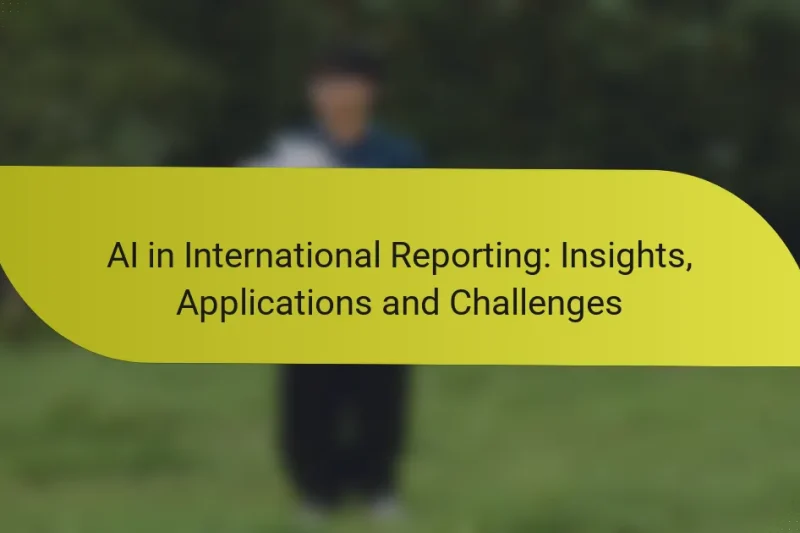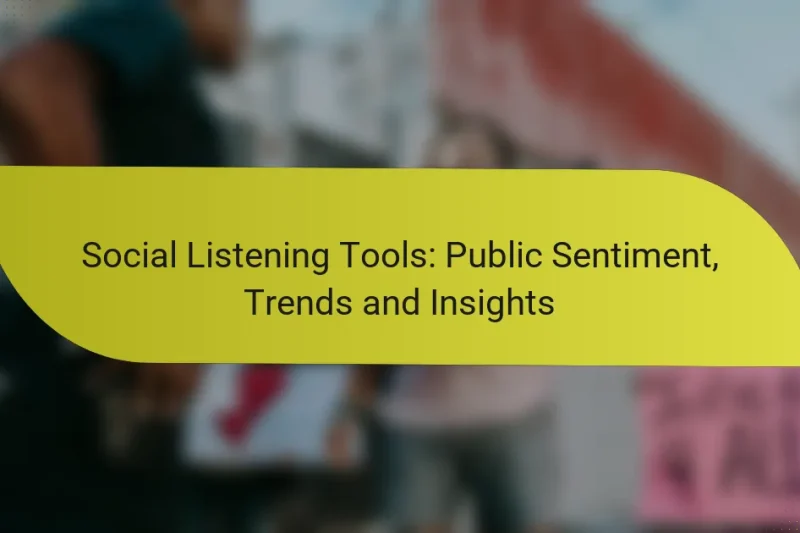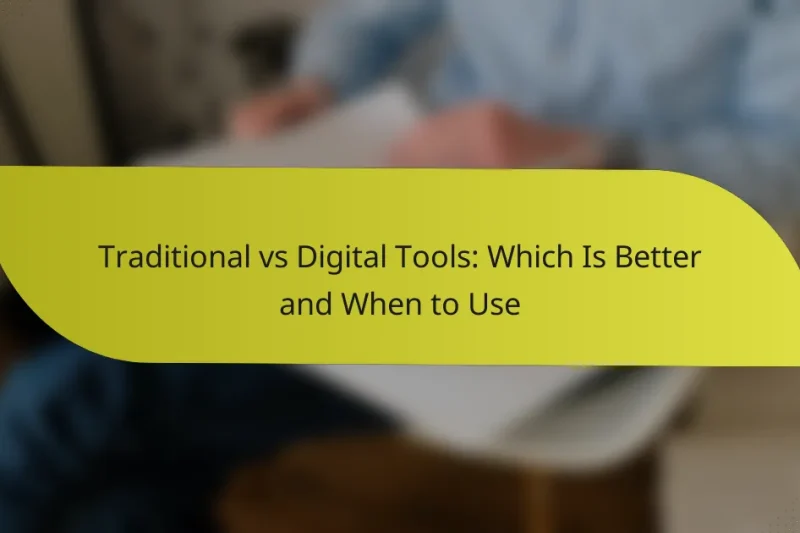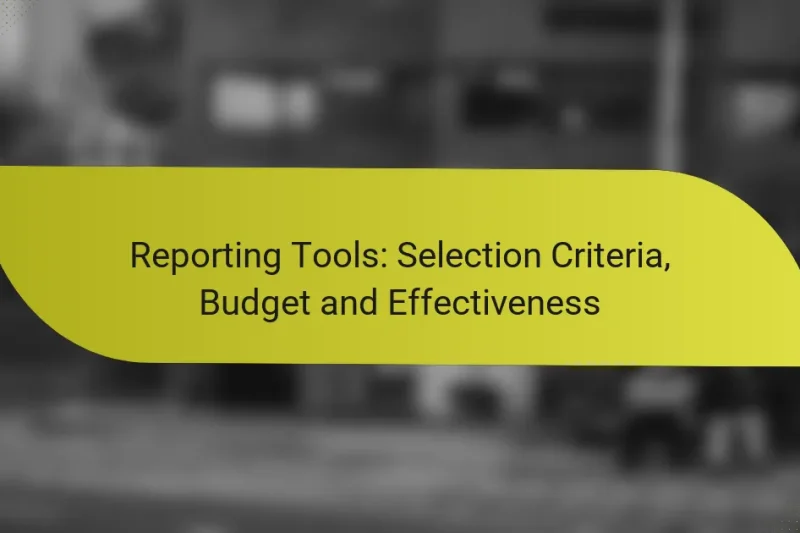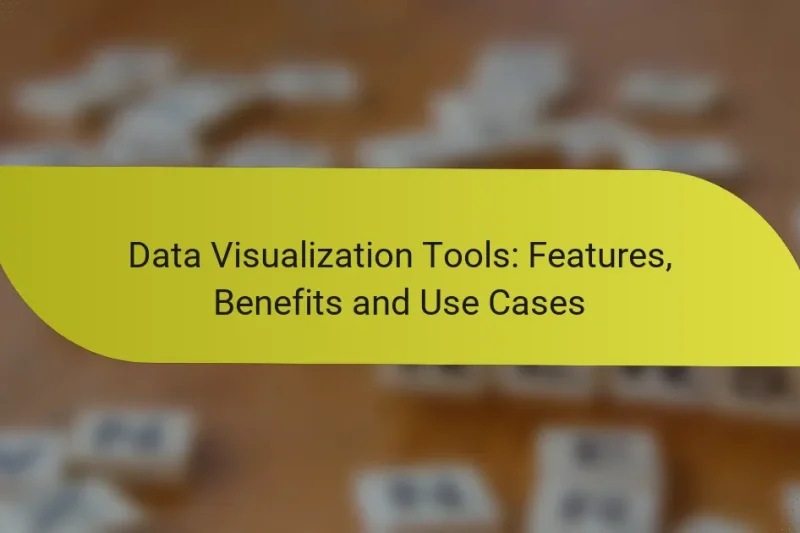AI is transforming international reporting by streamlining data analysis, accelerating news production, and enhancing audience interaction. … AI in International Reporting: Insights, Applications and ChallengesRead more
Effective Tools for International Affairs Reporting
In the realm of international affairs reporting, utilizing effective tools is crucial for journalists to deliver timely and accurate information. Major news agencies and specialized platforms provide access to diverse perspectives and essential data, while social media enhances engagement and real-time updates. By leveraging robust analytics and multilingual support, reporters can navigate complex global issues and collaborate efficiently across borders.
Sourcing Platforms: News, Analysis and Trends
Sourcing platforms for news and analysis play a crucial role in helping businesses navigate the complex … Sourcing Platforms: News, Analysis and TrendsRead more
Social Listening Tools: Public Sentiment, Trends and Insights
Social listening tools are essential for analyzing public sentiment and tracking trends across various online platforms. … Social Listening Tools: Public Sentiment, Trends and InsightsRead more
Traditional vs Digital Tools: Which Is Better and When to Use
The debate between traditional and digital marketing tools is ongoing, with each method offering unique advantages … Traditional vs Digital Tools: Which Is Better and When to UseRead more
Fact-Checking Software: Accuracy, Tools and Best Practices
Fact-checking software plays a crucial role in verifying the accuracy of information in today’s fast-paced digital … Fact-Checking Software: Accuracy, Tools and Best PracticesRead more
Reporting Tools: Selection Criteria, Budget and Effectiveness
Choosing the right reporting tool is crucial for effective display advertising, as it can significantly enhance … Reporting Tools: Selection Criteria, Budget and EffectivenessRead more
Data Visualization Tools: Features, Benefits and Use Cases
Data visualization tools play a crucial role in helping organizations convert complex datasets into clear, visual … Data Visualization Tools: Features, Benefits and Use CasesRead more
What are the best tools for international affairs reporting?
The best tools for international affairs reporting include major news agencies and specialized platforms that provide timely and accurate information. These tools help journalists access diverse perspectives, data, and analysis necessary for comprehensive reporting on global issues.
Reuters
Reuters is a leading global news organization known for its fast and reliable reporting. It offers a comprehensive suite of tools, including real-time news feeds, financial data, and multimedia content, making it essential for journalists covering international affairs.
Utilizing Reuters can enhance reporting accuracy, as it provides access to a wide range of sources and expert analysis. Journalists should consider subscribing to their services for in-depth coverage and breaking news alerts.
Associated Press
The Associated Press (AP) is a not-for-profit news cooperative that delivers news from around the world. It is particularly valuable for its extensive network of reporters and stringers who provide on-the-ground insights into international events.
AP offers various resources, including text, photos, and videos, which can enrich storytelling. Journalists should leverage AP’s content for credible sourcing and diverse viewpoints in their reports.
Bloomberg
Bloomberg is a premier source for financial news and data, making it crucial for reporting on international economic affairs. It provides in-depth analysis, market data, and expert commentary that can inform stories about global markets and economic policies.
Journalists should utilize Bloomberg’s analytics tools and subscription services to gain insights into economic trends and corporate developments that impact international relations.
Al Jazeera
Al Jazeera is known for its comprehensive coverage of Middle Eastern affairs and global issues from a different perspective. It offers a range of multimedia content, including articles, documentaries, and live broadcasts, which can provide unique angles on international stories.
Using Al Jazeera can help reporters uncover narratives that may be overlooked by Western media. Journalists should consider incorporating its content to diversify their sources and viewpoints.
Foreign Policy
Foreign Policy is a magazine and website that focuses on global affairs, current events, and domestic policy. It provides in-depth articles, expert opinions, and analysis on international relations, making it a valuable resource for journalists.
Reporters can benefit from Foreign Policy’s analytical pieces and commentary to enhance their understanding of complex geopolitical issues. Regularly reading its content can help journalists stay informed about the latest developments in international affairs.
How can journalists utilize social media for international reporting?
Journalists can leverage social media to enhance their international reporting by accessing real-time information, engaging with audiences, and sharing compelling visual content. These platforms allow for immediate dissemination of news and foster direct interaction with readers, making them essential tools in the modern media landscape.
Twitter for real-time updates
Twitter is a powerful tool for journalists seeking real-time updates on international events. With its fast-paced nature, journalists can follow breaking news, monitor trends, and engage with sources instantly. Utilizing hashtags related to specific events can help in tracking conversations and gathering insights.
To maximize effectiveness, journalists should curate lists of relevant accounts to follow, including official organizations, experts, and local journalists. This approach ensures a steady flow of credible information and diverse perspectives.
Facebook for audience engagement
Facebook serves as an excellent platform for journalists to engage with their audience on international issues. Through posts, live videos, and interactive content, journalists can foster discussions and gather feedback from readers. This engagement can enhance the depth of reporting by incorporating audience questions and concerns.
Creating dedicated groups or pages focused on specific international topics can help build a community of interested readers. Regular updates and interactive content, such as polls or Q&A sessions, can keep the audience engaged and informed.
Instagram for visual storytelling
Instagram is ideal for visual storytelling, allowing journalists to share impactful images and videos that convey the essence of international events. High-quality visuals can capture attention and evoke emotions, making complex issues more relatable to the audience.
To effectively use Instagram, journalists should focus on creating a cohesive aesthetic and utilizing stories to provide behind-the-scenes insights. Engaging captions and relevant hashtags can further enhance visibility and encourage audience interaction.
What are the key features of effective reporting tools?
Effective reporting tools for international affairs should offer robust data analytics, multilingual support, and collaboration features. These capabilities enhance the ability to gather insights, communicate across language barriers, and work efficiently with teams globally.
Data analytics capabilities
Data analytics capabilities are essential for interpreting complex information and trends in international affairs. Tools should provide features like data visualization, real-time analytics, and reporting dashboards to help journalists quickly assess situations and make informed decisions.
Look for tools that can handle large datasets and offer customizable reports. For example, platforms that integrate with social media analytics can provide insights into public sentiment, which is crucial for understanding international issues.
Multilingual support
Multilingual support is vital for reporting on international affairs, as it allows journalists to access and communicate information in various languages. Effective tools should offer translation features and support for multiple languages to ensure accurate reporting across different regions.
Consider tools that include built-in translation services or integration with third-party translation software. This can significantly reduce the time needed to translate documents and facilitate smoother communication with local sources.
Collaboration features
Collaboration features enable teams to work together efficiently, regardless of their geographical locations. Effective reporting tools should include options for real-time editing, shared workspaces, and communication channels to streamline the reporting process.
Look for platforms that allow for easy sharing of documents and feedback, such as cloud-based solutions. This ensures that all team members can contribute and stay updated on developments, which is crucial in fast-paced international reporting environments.
What are the challenges in international affairs reporting?
International affairs reporting faces several challenges that can hinder the accuracy and depth of coverage. Key issues include accessing reliable information, overcoming language barriers, and navigating political censorship.
Access to reliable information
Accessing reliable information is crucial for accurate international affairs reporting. Journalists often rely on a mix of official sources, local contacts, and independent research to verify facts. However, the availability of trustworthy data can vary significantly by region, making it essential to establish a network of credible informants.
To enhance reliability, reporters should cross-check information from multiple sources and consider the context in which it was gathered. Utilizing established databases and reputable news outlets can also help in obtaining verified information.
Language barriers
Language barriers can complicate international reporting, as they may prevent journalists from fully understanding the nuances of a situation. This challenge necessitates proficiency in relevant languages or the use of professional translators to ensure accurate communication.
Reporters should prioritize learning key phrases in local languages to build rapport and facilitate interviews. Additionally, employing translation tools can assist in overcoming immediate language hurdles, though they should not replace human translators for nuanced discussions.
Political censorship
Political censorship poses a significant challenge in many regions, impacting the flow of information and the ability to report freely. Governments may impose restrictions on media outlets, limiting access to certain topics or requiring prior approval for publication.
Journalists must remain aware of the local legal landscape and adapt their reporting strategies accordingly. Engaging with local journalists can provide insights into navigating censorship, while using secure communication methods can help protect sensitive information.
How to choose the right reporting tools for international coverage?
Selecting the right reporting tools for international coverage involves assessing the specific needs of your audience and the nature of the stories you plan to cover. Consider factors such as language support, data accessibility, and the ability to collaborate across borders.
Assess user needs
Understanding user needs is crucial when choosing reporting tools for international coverage. Identify the primary audience for your reports and their preferences regarding content format, language, and accessibility. This will guide your tool selection process.
Consider conducting surveys or interviews with potential users to gather insights on what features they value most. For example, if your audience includes non-English speakers, prioritize tools that offer multilingual support and easy translation features.
Additionally, evaluate the technical capabilities of your team. If your reporters are not tech-savvy, opt for user-friendly tools that require minimal training. Balancing complexity and usability will enhance productivity and the quality of your international reporting.
